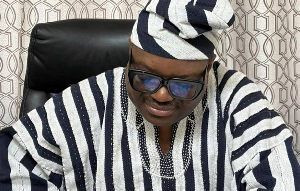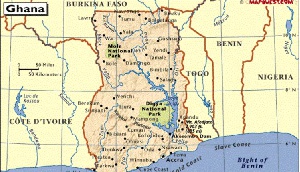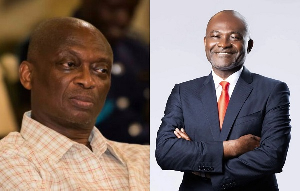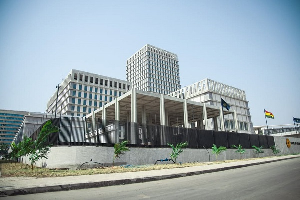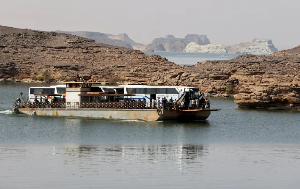In August 1914, a joint force of Britain and France conquered German Togoland. This conquest was remarkable because it was the first Allied victory over Germany in the First World War. German Togoland was split in two. A part, French Togoland, was given to France. The other half, British Togoland, was given to Britain.
Divided Togoland was to be administered as a mandated territory under the League of Nations and as a trust territory under the United Nations (UN). Under the UN, the administration of divided Togoland was done by Administering Authorities, subject to chapter 13, to some extent, Article 73 of the UN Charter and International Trusteeship Agreements (ITAs)
Prof. Amenumey, a living authority on British Togoland History (Daily Graphic of September 3, 2016), was absolutely right and the Homeland Study Group Foundation of Ho (Daily Graphic, August 18, 2016) was absolutely wrong.
The UN Trust Territory of Togoland under UK Administration (British or Western Togoland) referred to above and which took part in the May 9, 1956 Plebiscite, did not, does not and has never included Peki, Tongu, Anlo and Some areas. All these areas were part of South Eastern Gold Coast or what some people choose to refer to as the Volta Triangle or Trans Volta.
Adding these areas to British Togoland, advertently or inadvertently, out of good intention or ignorance or out of mischief, can only harm and weaken the strong case that the people of British Togoland have.
Secondly, Trans Volta/Togoland, renamed Volta Region after independence, is not and has never been the same as British Togoland (Therson-Cofie, The Mirror, Friday 2-8, 2016) Trans Volta/Togoland was constituted only in 1951/2 by British Ordinance and comprised of Southern British Togoland and South Eastern Gold Coast.
Role of Britain
However, the crux of the matter is that if Britain had operated within the ambit of Chapter 13 and Article 73 of the UN Charter and had duly granted self-government/independence to British Togoland on her own, just as France commendably did grant independence to Togoland’s twin sister, Togo, there would not have been any “brouhaha over Togoland Plebiscite” (Prof. Amenumey) or Togoland Question/problem today.
In a lame, inexcusable defence of her action in British Togoland, Britain claimed to have been guided by the phrase “as may be appropriate to the particular circumstances of each territory and its people” in Article 76(b) of the UN Charter. However, “particular circumstances” in this context can only be meaningful, relevant and appropriate within the following context of the UN Purposes and Principles;
1. “ to ensure…their (non-self-governing territories) protection against abuses” Article 73(a)
2. “to further international peace and security” Article 76(a)
3. to ensure “progressive development towards self-government or independence” Article 76(b), and above all,
4. UN Resolution 1514(XV), with particular reference to,
(i)”Convinced that all peoples have an inalienable right to complete freedom, the exercise of their sovereignty and the integrity of their national territory”
(ii) Inadequacy of political, economic, social or educational preparedness should never serve as a pretext for delaying independence”.
Seen from every angle, there was absolutely no need for the May 1956 Plebiscite. It was ill-conceived and premature. It is clear that Britain and her collaborators in the UN committed a serious error of judgement in handling the Togoland case and they must admit it. Nothing can ever justify depriving Togoland of her inalienable rights to sovereignty and independence. Subjugating and forcibly integrating her into Ghana (Gold Coast) was morally and legally wrong and untenable.
Betrayal of trust
We, the people of British Togoland, have said it several times and we still maintain our stand that Britain breached her trust and betrayed the people of Togoland by re-colonising and forcibly integrating them into Ghana. We consider this betrayal as heartless and inhuman.
It defied, and still defies, all logic and common sense. We think it was an unmitigated crime and aggression committed against Togoland and it deserves to be soundly and properly denounced and condemned by all men and women who cherish peace and uphold justice.
You will recall that under the UN Charter and the International Trusteeship Agreement, Britain willingly undertook to protect and defend Togoland and her territorial integrity. Not only that, she also solemnly promised to prepare Togoland for self-government and independence.
Unfortunately, Britain woefully reneged on her promise, trust and responsibility and rather did the most cowardly thing of occupying and forcibly integrating Togoland into her colony, the Gold Coast (Ghana)! By this act, Britain deprived Togoland of her fundamental and inalienable rights to sovereignty, freedom, independence, national identity and territorial integrity.
This betrayal also left the people of Togoland without any constitutional rights, safeguards and guarantees. Simply put, Britain was a traitor to the hope and aspirations of the people of Togoland.
Indeed, Britain willfully exploited and abused her immense influence and power in the UN to perpetrate this unthinkable injustice and wrong against Togoland at a time that Togoland and her people were extremely weak, powerless, voiceless, intimidated, defenceless and oppressed and could not freely express their wishes (Article 76 (b) of UN Charter) on issues raised by the 1956 Plebiscite and its aftermath.
Togoland was a trust territory (a territory held in trust under the UN Charter by Britain for the UN and the people of Togoland). She was not a member of the UN so she had no representation, vote or voice in the UN or any of its organs.
Britain, on the other hand, was not only a member but also a very powerful and influential member not only of the UN but also of the Security Council and the Trusteeship Council. While Togoland’s hands were firmly and completely tied behind her, Britain had all the freedom and advantage to undermine and subvert Togoland’s aspirations.
The irony was that Britain was supposed to represent the interest of Togoland in the UN! The encounter between Britain and Togoland was a complete mismatch. It was no contest. It was like using a juggernaut to crush an ant!
Britain used and exploited, without any qualms, the UN and its statutory organs to neutralise and frustrate Togoland’s struggle and quest for independence. That was, to say the least, unethical and an unbecoming conduct on the part of an Administering Authority that undertook to protect and prepare Togoland for independence.
Accusations
In order to justify her infamy towards Togoland, Britain, in a typical Nazi style, subjected Togoland to the game of victim blaming. She gratuitously accused Togoland of being too small and too poor to stand on her own as an independent state! Britain stated further that Togoland did not have the capacity to sustain her independence if granted one because she was not economically viable and was landlocked! By the way, when did these reasons become a factor or criteria for determining who should or should not be granted independence?
Clearly, Britain and her collaborators had no reason, whatsoever, to deny Togoland her fundamental freedoms. Indeed, all the reasons advanced by her against Togoland independence were just red herring; extremely childish, ridiculous and untenable. However, she advanced them all the same because she was desperate to give reasons why Togoland should be annexed and integrated into Ghana.
This was a clear case of giving a dog a bad name just to hang it! Surprisingly, at that time in the UN, there were member states such as India who supported Britain! Britain and her collaborators in the UN must be ashamed of themselves for the wrongs and injustice inflicted on Togoland, considering the fact that today, the UN and the Commonwealth are almost dominated by poor, small, landlocked and economically deprived states. Some of these states are even described as failed states!
If these poor, small, politically unstable and landlocked states are qualified to be independent and full members of the UN, then why not British Togoland?
The people of Togoland have always been of the firm conviction that Britain or the UN or the oppressed and intimidated colonial Togoland do not have the right or authority to decide what the sovereign and independent people of Togoland should do with their territory, sovereignty and freedom. It is their thinking that only a sovereign, independent Togoland has the sole prerogative, right and authority to decide on these inalienable issues. This thinking is strongly and conclusively supported by the UN Charter, UN Resolution 1540 (XV) and International Law.
Illegality
The view is strongly held that whatever action the UN and Britain took or might have taken regarding colonial Togoland does not apply to sovereign independent Togoland. To this end, therefore, the ill-conceived and flawed May 9, 1956 Plebiscite, its results and the UN Resolution 1044(XI) which were meant to decide the political fate and destiny of Togoland could not be said to be valid, legitimate, legal, ethical or right.
Even more controversial was the premature termination of the International Trusteeship Agreement on Togoland. No adequate due diligence was done by the UN before the hasty termination. The termination was inimical to Togoland’s interest. Of greater relevance was the fact that the termination was conditional.
It was contingent on Britain taking all necessary steps to bring about the union between Togoland and Ghana.This Britain woefully failed to do. For instance, a critical, in fact, an indispensable step Britain failed to take was to convene a constitutional conference for Ghana and Togoland or their accredited representatives to democratically enact a mutually negotiated and accepted constitution to establish, regulate and guide the union government.
It can clearly be established or proved, beyond all doubts, that there was no deal between Ghana and Togoland or their accredited representatives. Furthermore, the so-called Ghana-Togoland Union has no mutually negotiated, enacted and accepted Union Document or Act to establish, regulate and guide it. To this end, the so-called Ghana-British Togoland Union is neither legal, credible nor legitimate.
The writer is a former MP for Hohoe South.
Opinions of Wednesday, 12 October 2016
Columnist: Kosi Kedem
British Togoland’s political misfortunes - Britain is wholly to blame
Entertainment

Chez Amis CEO addresses NACOC arrest allegations
Opinions
